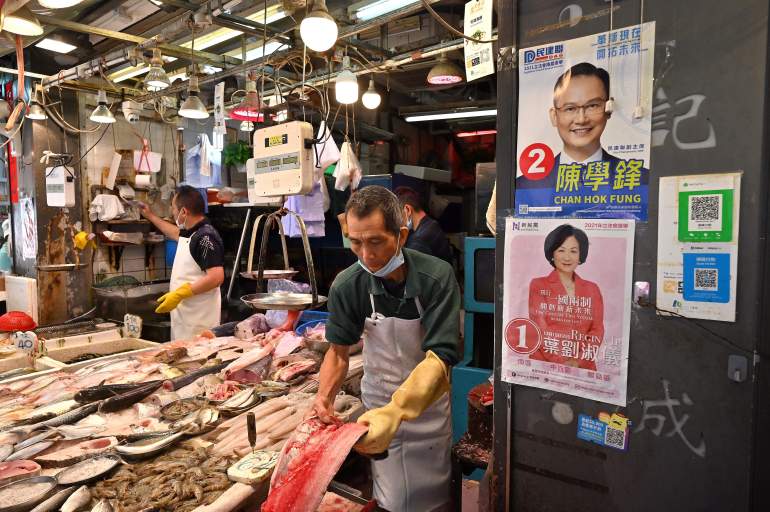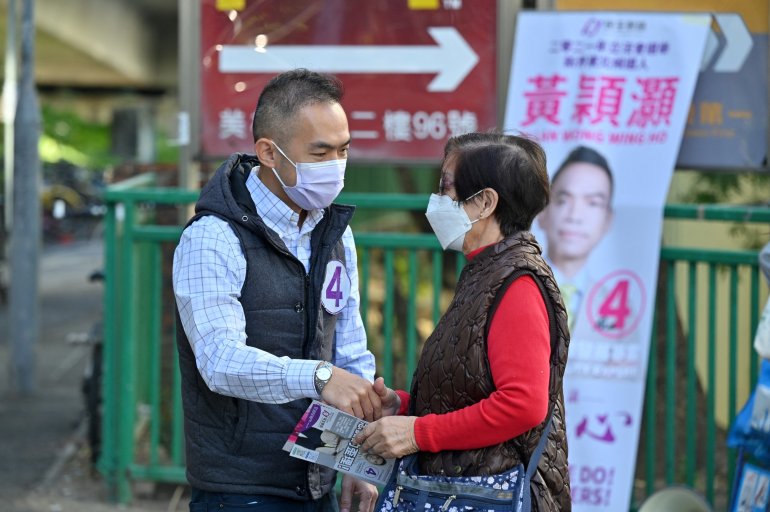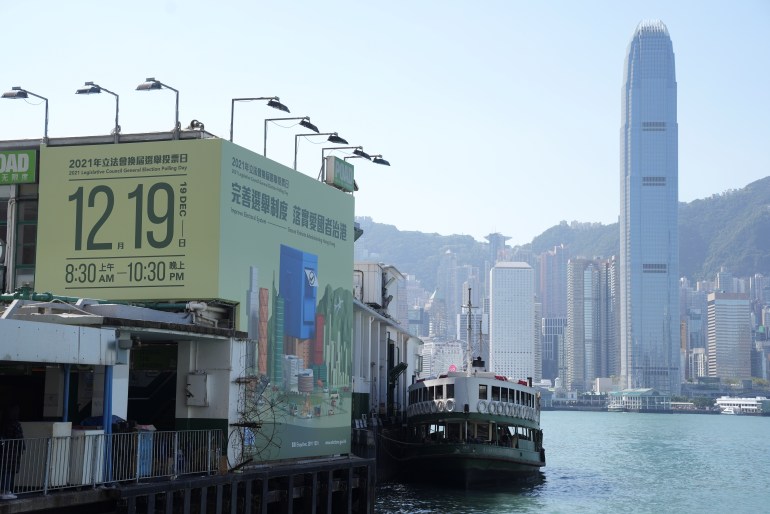Hong Kong gears up for ‘patriots-only’ poll amid boycott calls
Activists in Hong Kong call for a boycott of December 19 vote, saying the poll is a ‘selection’ and not an ‘election’.

With days remaining for Hong Kong’s legislative elections, candidates are hitting the Chinese-controlled city’s streets canvassing for last-minute votes. But residents say there is little enthusiasm to vote this time.
One woman told Al Jazeera that many voters in Hong Kong see the December 19 poll as a “selection” and not an “election”. That is because electoral reforms – introduced by Beijing earlier this year – mean that only candidates who passed the authorities’ “patriots only” vetting process were allowed to run.
Keep reading
list of 4 itemsHong Kong democracy activists found guilty over Tiananmen vigil
‘Toxic climate’: Hong Kong pilots buckle under ‘Zero COVID’ rules
Swiss International cuts Hong Kong flights over quarantine rules
Only three of the 153 candidates contesting this year’s election openly identify as pro-democracy, according to the South China Morning Post, marking a dramatic change in the semi-autonomous territory that was roiled by protests calling for greater democracy in 2014 and again, in 2019.
“What you see is people giving a very wide berth to candidates,” said the resident, who wished to remain anonymous for fear of repercussions.
“No one is taking a pamphlet. People see the candidates on the sidewalk and they cross the road, the same way they cross the road when they see a police station or the national security office.”
Originally set for September of last year, the election for Hong Kong’s legislative council was delayed for more than a year, with authorities citing concern over the COVID-19 pandemic. The decision to postpone the vote followed a sweeping crackdown on dissent in China’s freest city, with mass arrests and Beijing introducing a national security law that criminalised subversion, secession, terrorism and collusion with foreign forces with up to life in prison. That law has been used to pursue politicians, activists and even the media. Most of the city’s pro-democracy politicians now are either in prison or in exile.

As Hong Kong’s political freedoms all but disappeared, Beijing took aim at the city’s parliament, known as the LegCo. The electoral changes have redrawn districts and cut down the number of candidates chosen directly by the public from 35 to 20.
Another 30 seats will be chosen by voting blocs linked to professions, and 40 seats will be appointed by a committee headed by Hong Kong’s pro-Beijing leader, Carrie Lam.
Boycott calls
Amid the clampdown, the Hong Kong Public Opinion Research Institute found that only 52 percent of respondents plan to vote, marking a 30-year low for the legislative elections. Many voters are expected to boycott the vote or spoil their ballot, although urging others to do so could lead to arrest.
Six people have been arrested so far for urging others to boycott, according to local media, or simply reposting Facebook posts about a potential boycott. The government has also issued arrest warrants for former legislators Ted Hui and Yau Man-chun, who have called for a boycott of the vote from exile in the United Kingdom and Australia, respectively.
Even so, many feel it is the only option they have left.
“Right now the biggest discussion in Hong Kong is how do people mobilise in a climate where everything is predetermined and you don’t have a meaningful opportunity to exercise your views; because there isn’t any candidate who will speak to electoral reform, democracy or the principles of the Basic Law that we have been promised,” the resident said.
“The discussion in Hong Kong right now is whether you don’t vote, or whether you go and cast a blank ballot and which of these tactics is more meaningful, so to speak. Now there’s different views obviously, but one way to think about it is authoritarian regimes everywhere like to legitimise themselves through performative democracy. You are giving them an opportunity [so they] can say a certain percentage of the public participated.”
Exiled Hong Kong democracy activist Nathan Law also described the vote to Al Jazeera as a “selection” process.
“It is not an election – candidates are thoroughly screened by political police and they had to have support from pro-Beijing politicians,” he said. “The popularly elected seats have drastically reduced to only 20 percent. We should not give any legitimacy to this election by voting.”
New faces
The strict vetting process and the sidelining of the city’s pro-democracy camp mean that many candidates standing in Sunday’s elections are first timers, who critics say can be seen in their lack of understanding of issues that affect their constituencies, such as how the city’s subway system operates and where stations are located.
“There is a distinct lack of debate and knowledge among the candidates, some really struggle to know – it seems – their own community. One was mocked for not knowing there was a metro station in Sai Wan Ho, others just don’t talk about policy, don’t have manifestos or aren’t even on social media,” said a journalist in Hong Kong who asked to remain anonymous citing the authorities’ shifting “red lines”.
But city authorities say the new faces could mean a fresh start for Hong Kong’s legislature after the unrest of 2019.
“It may appear that you don’t have many of the old faces from the pro-democracy camp so to say, but then is it fair to say that these are now faces with one voice only,” said Bernard Chan, a deputy at the National People’s Congress of China and a non-official convenor of the government’s Executive Council, however.
“I believe every district has an opposition person running, but they don’t have the same baggage like the others.”

He added, “(Beijing) made it clear that they welcome opposition, so long that they uphold the principle of the Chinese constitution and the Hong Kong constitution, which is called the Basic Law. They welcome that. And of course, they have not broken the law during 2019 social unrest, so that’s basically is the red line.”
Anticipating a lower turnout, Lam, the chief executive of Hong Kong, has pre-emptively said this would suggest voters are content with their government, but elsewhere Hong Kong authorities have become sensitive to the slightest criticism. They recently warned both The Wall Street Journal and the UK’s Sunday Times that they could be found guilty of incitement for articles critical of the upcoming poll.
Bread and butter issues
Despite the bad press, Lam and her government may still have something to gain from an uneventful vote, said Tai Wei Lim, a research fellow adjunct at the National University of Singapore East Asian Institute.
Lam can show Beijing that the city has returned to normal while also courting the people of Hong Kong on issues beyond democracy, he said, like crippling rent and deep wealth inequality.
“From the Hong Kong authorities and Central Government in Beijing’s perspective, economic bread and butter issues can win the hearts and the minds of the people, including housing issues and public infrastructure for trade and commerce,” Lim said by email.
“Thus, they hope to have more political support from patriotic candidates (patriotism according to their criteria) to work with technocrats /bureaucrats in government service to construct these items.”

Hong Kong’s semi-democratic legislature has been operating without an opposition since November 2020, when 15 pro-democracy legislatures resigned en masse after the government removed several of their colleagues for their political views. Their absence has meant the government has been able to push through large construction projects like a controversial island-building development dubbed Lantau Tomorrow Vision to create more space for housing.
Many of the opposition politicians are now in prison awaiting trial after they helped organise an unofficial primary election for pro-democracy candidates in November 2019. The primary election became a major embarrassment to the Hong Kong government after it drew a record turnout of 600,000 voters, a sign that the city of 7.4 million people still supported democracy even after mass protests failed to bring about changes.
Opposition legislators and election organisers were among the 55 people detained in an unprecedented mass arrest on January 6 this year, and 47 of the group have been charged with conspiracy to commit subversion. The majority have remained in detention due to continuing trial delays, but substantive arguments are expected to begin early next year, according to Hong Kong Free Press.
Holding elections in such conditions makes them little more than a charade, said Johnny Patterson, co-founder and policy director of the UK-based Hong Kong Watch, as the opposition has been silenced in favour of pro-Beijing candidates.
“These elections are a total sham. Earlier this year, the National Security police rounded up the entire pro-democracy camp and placed them under arrest for national security crimes, making meaningful opposition illegal. More recently, the police were threatening voters that boycotting the election could now be a crime,” he said.
“The whole process shows just how far the political situation has deteriorated.”